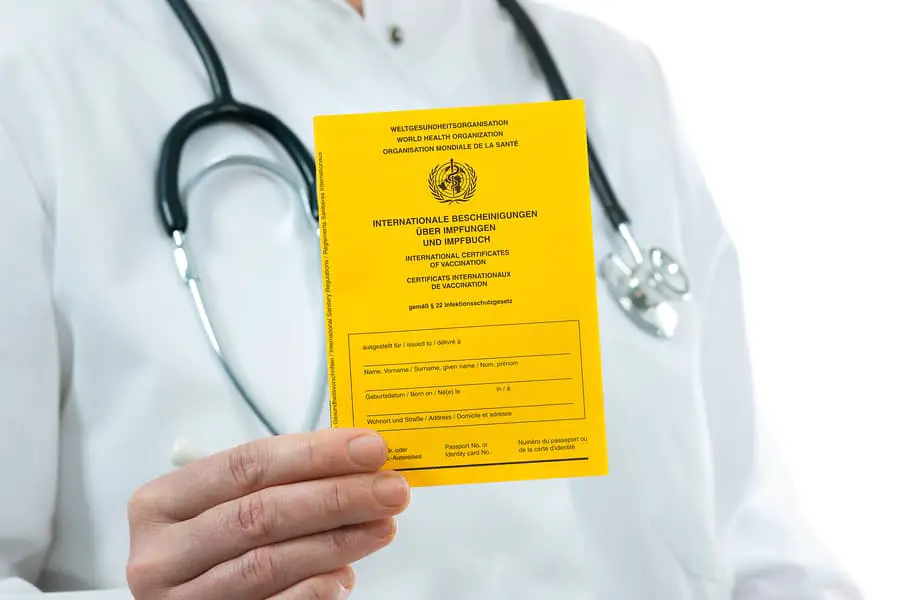Table of Contents
*This post may contain affiliate links. As an Amazon Associate we earn from qualifying purchases.
Are you traveling to Africa? You must be thrilled!
When your Africa safari is booked and ready, you’ll experience a surge of emotions – from the excitement of anticipating a new safari adventure to the tiny tingles of anxiety about your health concerns (usually fuelled by family and friends who have never been to Africa).
Fortunately, with some medical checkup from your able doctor plus some recommended up-to-date immunizations, you’ll be good to go. In fact, the riskiest part of your journey is likely to be that long-haul flight to Africa.
Compulsory Immunizations for Travel to Africa
There are some vaccines that you can’t travel to Africa without getting. Yellow fever vaccine is the most common one.
In many African countries (especially the ones in which the disease is endemic), you’ll have to provide proof of your yellow fever immunization as a legal requirement to gain entry.
In addition, if you are traveling from or have spent a significant amount of time in a yellow fever country, non-endemic countries will also ask for proof of your vaccination.
Recommended Immunizations
There are some vaccines that are not a must in Europe and the United States, but are recommended for those escaping for an Africa safari.
These include immunizations against diseases such as typhoid and hepatitis A, which can easily be contracted through contaminated water and food. Hepatitis B, on the other hand, can be transmitted through bodily fluids, contamination of unscreened blood, and sexual contact with a new partner.
Rabies is also a common problem in Africa. It is usually transmitted by mammals including rats, dogs, and bats. So the next time you’re on an African safari, be on the lookout for those wild rodents.
Routine Immunizations
Just like any other foreign travel, it is always advisable to make sure your vaccines are up-to-date. These vaccines were probably administered to you when you were still a child.
They include vaccines for polio, chicken pox, diphtheria-tetanus-pertussis, as well as the measles and mumps vaccines.
Check with your physician to see whether you may need a booster. If you are traveling with your kids, ensure that they’ve had their routine vaccines.
Some travel vaccinations need to be administered in stages and may take several weeks to complete. Therefore, to ensure you get the vaccines on time, it’ll be wise to book doctor’s appointments several months before you begin your African safari adventure.
Country-Specific Immunizations
Depending on the African region you are planning to visit, there are a number of endemic diseases you will need to get a shot against.
For example, the sub-Saharan countries in Africa like Uganda, Kenya, and Ethiopia are part of the “meningitis belt,” and meningococcal meningitis vaccines are strongly recommended.
Another sub-Saharan problem is malaria. Although there is currently no vaccine for this disease, your doctor can prescribe you some prophylactics to reduce the likelihood of an infection.
The other diseases in Africa that you can’t vaccinate against are the Zika Virus, the dengue fever, and the West Nile virus, all of which are spread by the mosquitoes. This means that the best way of preventing these diseases is using mosquito repellants while on a safari.
Situated at the southern hemisphere subtropical zone, the climate in South Africa is quite different from that in sub-Saharan countries and somehow similar to that in the southern part of the U.S. So are immunizations required for travel to South Africa?
Definitely! Some immunizations for travel to South Africa include yellow fever, typhoid, hepatitis A, hepatitis B, influenza, cholera, and rabies.
Tips to Stay Healthy While on Safari
Many travelers get so caught up on getting vaccines that they forget about other important health concerns that may affect them on their African safari.
Here are some tips that will ensure your safari is a success:
- Visit your doctor in good time before you leave to discuss any other personal health concerns you may have.
- Try to keep fit and eat healthy months before you travel. You wouldn’t want to start your vacation with a cold, would you?
- Stock up enough prescription drugs before you leave. Also, it’s a good idea to carry your doctor’s scripts and keep your scheduled medication in its original packaging.
- Consider carrying your diabetes monitor, spare contact lenses, asthma inhaler, and other over-the-counter medication that you can use (for example, painkillers and antihistamines).
- Ensure you inform your travel agent of any special needs, such as wheelchair-friendly environment and gluten-free meals, so that they can book your reservations accordingly.
- Don’t forget to carry your bug spray, sunscreen, safari hat, lightweight clothing for the tropical heat, and heavy clothing for the freezing nighttime.
Before leaving the country, ensure that you check the political situation of your destination – the internet and international news channels should provide you with credible information. Moreover, your travel agent will also advise you on which countries are safe to travel to for a particular period.
Have fun on your African safari adventure!

